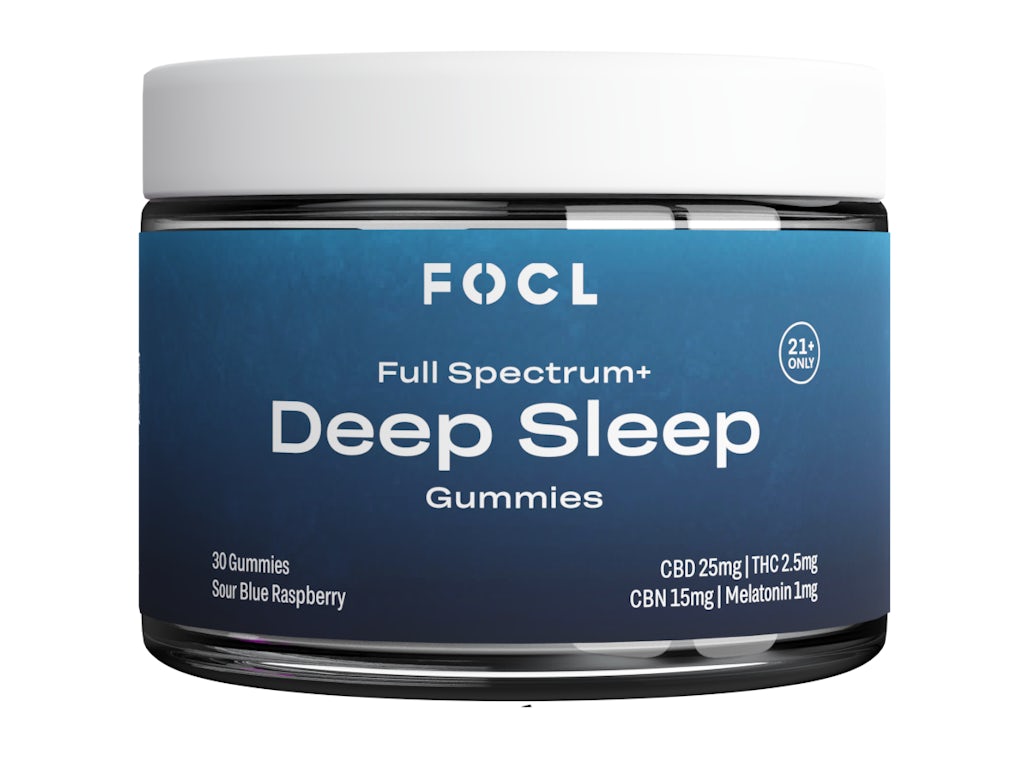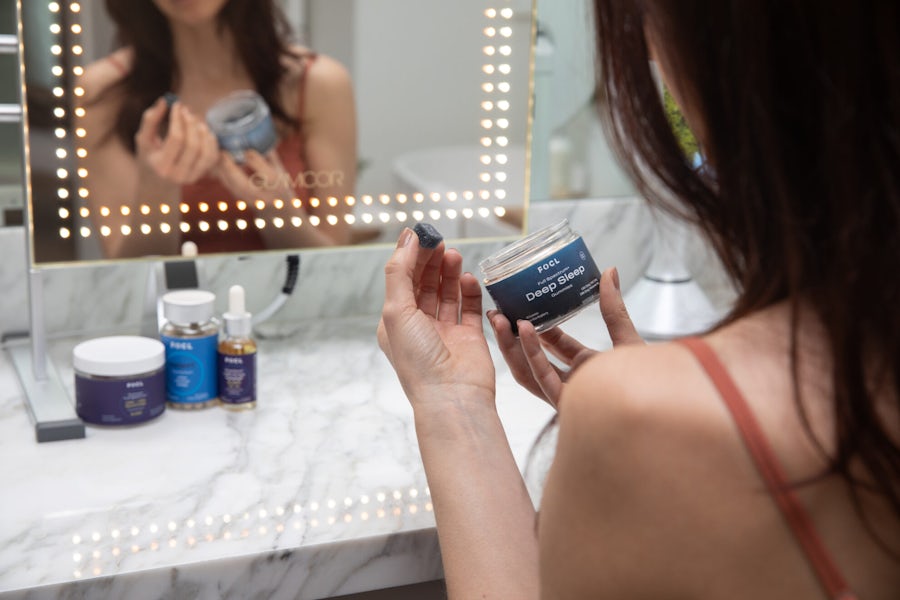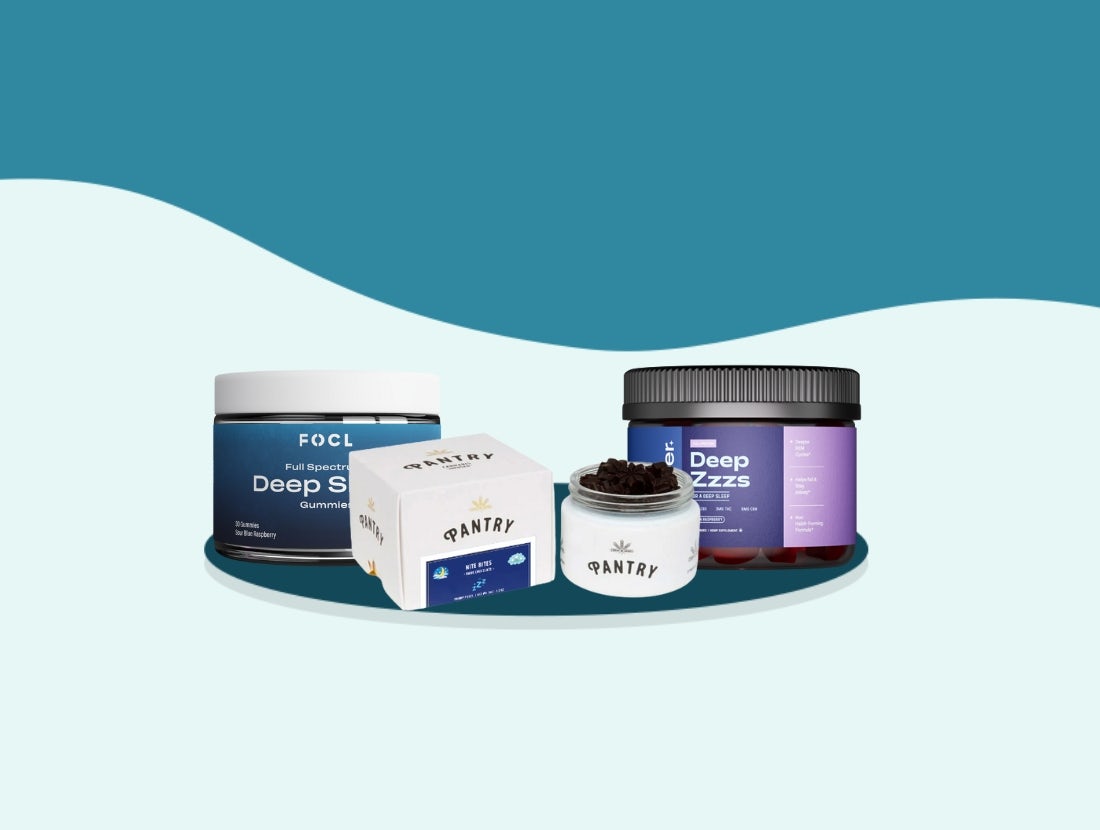Sleep is essential for overall health and well-being, and yet, many of us struggle to get a restful night’s sleep. From the daily stressors of life to hormonal changes, various factors can disrupt sleep patterns, especially for perimenopausal women. Night sweats, pain, mood swings and sleep apnea can all make catching enough z’s difficult during this inevitable transition period.
So, what’s a woman to do? Many turn to sleeping pills, hormone replacement therapy or to lifestyle changes like meditation, diet and exercise. Cannabis is also becoming a popular alternative as more and more countries legalize it, destigmatizing its use. In fact, a recent online survey of menopausal women found that 86% of respondents have used cannabis to manage menopause symptoms. A larger Canadian survey found that out of 499 cannabis consuming menopausal women, nearly 80% said cannabis helps manage their symptoms. 1
However, as we know – there’s more than one type of cannabis, and there are over 100 known cannabinoids. So which products are useful for sleep, and which are more likely to make the problem worse?
As with most things in the cannabis realm, this sort of thing can be pretty individual, though there are numerous studies that show that it can indeed help with sleep problems. A comprehensive understanding of how cannabis impacts sleep has eluded scientists so far, mostly due to the multiple variables at play, like dose, duration, and underlying reasons for sleep disturbances. As usual, more thorough randomized controlled trials are needed to solidify the scientific consensus.
But we’re not completely blind. Existing research shows that THC-containing strains (Type I or Type II) are your best bet for improving sleep, with some evidence suggesting that a terpene profile including myrcene, linalool or terpinolene could be helpful.
Introducing: FOCL’s Deep Sleep gummies
With products marketed as sleep aids flooding legal cannabis markets, one solution that has been gaining popularity among women seeking a natural way to promote relaxation is FOCL’s Deep Sleep CBD+THC gummies.
These gummies have a unique formulation that combines a tiny dose of melatonin with a blend of cannabinoids, including CBD, CBN, and THC, along with the amino acid L-theanine. This carefully crafted combination of ingredients is designed to help people struggling with sleep – including premenopausal and perimenopausal women – achieve a more restful and rejuvenating rest.
Cannabidiol, or CBD, is known for its anti-inflammatory and anti-anxiety properties. While we don’t fully understand exactly how CBD interacts with the body’s endocannabinoid system (ECS), we have evidence that it can help reduce anxiety and promote a sense of calm, which is crucial for a good night’s sleep. There are also some studies suggesting that CBD alone, or in combination with THC, can help to improve sleep in people experiencing symptoms of insomnia. 2
CBD is the primary active ingredient in FOCL’s sleep gummies, with a 25mg dose, along with 15mg of cannabinol, or CBN. While more research is needed to be sure, CBN is believed to be effective at promoting a state of calmness and relaxation.
While THC is often associated with the psychoactive effects of cannabis, FOCL’s Deep Sleep gummies contain only a low dose of THC (2.5mg), thoughtfully calibrated to enhance the effects of other cannabinoids without causing impairment or dependancy. The low dose of THC contributes anti-stress and relaxation properties that complement the other ingredients, creating a harmonious entourage effect that aids in achieving a deep and restorative sleep.
Beyond cannabinoids, FOCL’s sleep product also contains L-theanine, an amino acid commonly found in green tea. This powerful ingredient has a direct impact on numerous neurotransmitters, and is thought to have effects on memory and cognition. These effects have led scientists to conclude that L-Theanine could be used to promote sleep, calmness and even enhance cognitive performance. Just like the cannabinoids in the formulation, L-theanine can reduce stress, inflammation and anxiety, helping you to achieve a state of tranquility that is conducive to falling asleep faster and experiencing a more restful sleep. 3 4
Unlike some similar gummies for sleep on the market, FOCL’s Deep Sleep gummies include a small dose of melatonin, a hormone that regulates sleep-wake cycles. The relatively low dose of melatonin in the gummies (1mg) ensures that it supports sleep without disrupting natural circadian rhythms. There is even some evidence that melatonin may help to manage other non-sleep related symptoms of menopause, making this combination even more powerful. 5
FOCL gummies are known for their fast-acting formulation; helping you to fall asleep quicker and stay asleep longer. Upon waking, the majority of people using these gummies often report feeling refreshed and ready to tackle the day ahead.

Why premenopausal women love FOCL’s Deep Sleep gummies
These gummies have gained significant traction among premenopausal women seeking natural sleep solutions. Author and influencer Jen Hatmaker has openly discussed her positive experience with FOCL’s Deep Sleep gummies, highlighting the impact they’ve had on her sleep quality and overall well-being.
So why is this product so good for menopause symptoms? The truth is, though cannabis has been used to treat menopause pain as far back as 1924, there are few studies on cannabis and menopause specifically. Still, there’s plenty of research showing that cannabis can be beneficial for many of the symptoms that arise in menopause, such as insomnia, hot flashes, pain, anxiety and depression.
For example, research suggests that THC (and other CB1 receptor activators) can actually lower body temperature, which could help with hot flashes. However only high doses of cannabinoids have this cooling impact; lower doses may actually raise body temperature. So if you’re using cannabis to treat this symptom, you’ll need to hone in on the ideal dose for your needs, and be mindful of the symptoms you’re trying to treat. 6
Cannabis can also help ease chronic pain in general, and increased joint and muscle pain are common menopausal symptoms. One of the primary functions of the ECS is regulating pain sensation, and research has regularly found that cannabis can help with pain, and menopausal women have reported cannabis as helpful as well. 7 8
Cannabis products may also help with the emotional changes during menopause in other ways. Estrogen levels are also regulated by the ECS, and estrogen levels are changing quickly during menopause. It is possible that cannabinoids could help with symptoms related to hormone changes, but research is lacking on how cannabis may be able to do this, despite women reporting benefits. And then of course, there’s sleep. Research has found that THC can significantly decrease the time it takes otherwise healthy insomniacs to fall asleep, and along with the amount of times subjects wake up during the night. But chronic exposure to THC may actually lead to negative changes to sleep architecture, which is why FOCL thoughtfully blended numerous beneficial ingredients in these gummies, including a low dose of THC. 9 10 11
A cannabis brand that cares about evidence
As part of its commitment to testing and transparency, FOCL recently conducted a real-world data (RWD) collection effort in collaboration with The Cannigma and MoreBetter, creators of the Releaf App. By surveying consumers on their sleep experience while using the Deep Sleep gummies, we were able to glean valuable insights about which formulations work best for sleep – making the trial and error process simpler for generations of consumers to come.
Sources
- Babyn, K., Ross, S., Makowsky, M., Kiang, T., & Yuksel, N. (2023). Cannabis use for menopause in women aged 35 and over: a cross-sectional survey on usage patterns and perceptions in Alberta, Canada. BMJ open, 13(6), e069197. https://doi.org/10.1136/bmjopen-2022-069197
- Ranum, R. M., Whipple, M. O., Croghan, I., Bauer, B., Toussaint, L. L., & Vincent, A. (2023). Use of Cannabidiol in the Management of Insomnia: A Systematic Review. Cannabis and cannabinoid research, 8(2), 213–229. https://doi.org/10.1089/can.2022.0122
- Li, M. Y., Liu, H. Y., Wu, D. T., Kenaan, A., Geng, F., Li, H. B., Gunaratne, A., Li, H., & Gan, R. Y. (2022). L-Theanine: A Unique Functional Amino Acid in Tea (Camellia sinensis L.) With Multiple Health Benefits and Food Applications. Frontiers in nutrition, 9, 853846. https://doi.org/10.3389/fnut.2022.853846
- Baba, Y., Inagaki, S., Nakagawa, S., Kaneko, T., Kobayashi, M., & Takihara, T. (2021). Effects of l-Theanine on Cognitive Function in Middle-Aged and Older Subjects: A Randomized Placebo-Controlled Study. Journal of medicinal food, 24(4), 333–341. https://doi.org/10.1089/jmf.2020.4803
- Jehan, S., Jean-Louis, G., Zizi, F., Auguste, E., Pandi-Perumal, S. R., Gupta, R., Attarian, H., McFarlane, S. I., Hardeland, R., & Brzezinski, A. (2017). Sleep, Melatonin, and the Menopausal Transition: What Are the Links?. Sleep science (Sao Paulo, Brazil), 10(1), 11–18. https://doi.org/10.5935/1984-0063.20170003
- Wenger, T., & Moldrich, G. (2002). The role of endocannabinoids in the hypothalamic regulation of visceral function. Prostaglandins, leukotrienes, and essential fatty acids, 66(2-3), 301–307. https://doi.org/10.1054/plef.2001.0353
- Woodhams, S. G., Sagar, D. R., Burston, J. J., & Chapman, V. (2015). The role of the endocannabinoid system in pain. Handbook of experimental pharmacology, 227, 119–143. https://doi.org/10.1007/978-3-662-46450-2_7
- Babyn, K., Ross, S., Makowsky, M., Kiang, T., & Yuksel, N. (2023). Cannabis use for menopause in women aged 35 and over: a cross-sectional survey on usage patterns and perceptions in Alberta, Canada. BMJ open, 13(6), e069197. https://doi.org/10.1136/bmjopen-2022-069197
- Hill, M. N., Karacabeyli, E. S., & Gorzalka, B. B. (2007). Estrogen recruits the endocannabinoid system to modulate emotionality. Psychoneuroendocrinology, 32(4), 350–357. https://doi.org/10.1016/j.psyneuen.2007.02.003
- Mejia-Gomez, J., Phung, N., Philippopoulos, E., Murphy, K. E., & Wolfman, W. (2021). The impact of cannabis use on vasomotor symptoms, mood, insomnia and sexuality in perimenopausal and postmenopausal women: a systematic review. Climacteric : the journal of the International Menopause Society, 24(6), 572–576. https://doi.org/10.1080/13697137.2021.1898581
- Kaul, M., Zee, P. C., & Sahni, A. S. (2021). Effects of Cannabinoids on Sleep and their Therapeutic Potential for Sleep Disorders. Neurotherapeutics : the journal of the American Society for Experimental NeuroTherapeutics, 18(1), 217–227. https://doi.org/10.1007/s13311-021-01013-w
Sign up for bi-weekly updates, packed full of cannabis education, recipes, and tips. Your inbox will love it.

 Shop
Shop Support
Support



















